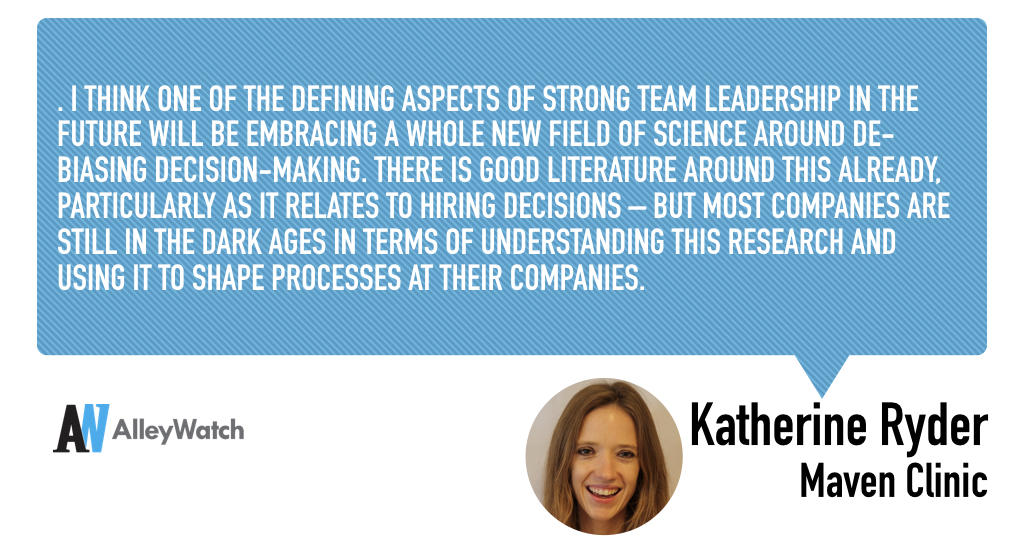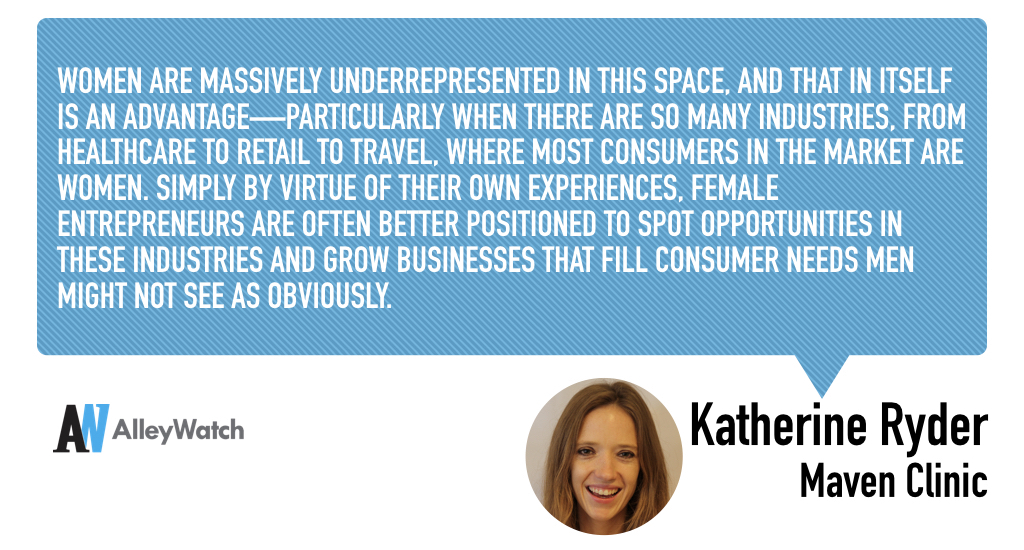This installment of Women in NYC Tech is presented by Kali. Kali is a chemical-free, organic tampon and pads subscription service. Stop using boring, chemical sticks and start caring about your lady parts. Kali – Not Your Mother’s Tampons.
Much has been said and written about the lack of women in the tech sector, be it as investors (or associates), founders, or in management positions at major companies. Is the problem the old boys network – or that success in technology is seen as a young man’s game? In this series, we speak with some of the top women in tech in New York as they discuss the challenges they face, the perceptions that need to be changed and the work that’s being done – or not – to help to promote women.
Today we speak with Katherine Ryder, founder and CEO of Maven Clinic – the first digital clinic for women. After beginning her career in journalism reporting for The Economist, WSJ and The New Yorker, Katherine joined Index Ventures in London as an early stage investor before founding Maven. Three years later and Maven is still growing stronger each day with notable investments from BoxGroup, Great Oaks and Female Founder Fund. The startup founded in 2015 just closed a $10.8M Series A round last week. Besides her company, which supports women’s health, Katherine is active in the NYC ecosystem in creating a brighter future for women in tech.
What’s your background and how did you develop your career as a female entrepreneur in the NYC tech ecosystem
I worked as a journalist in various roles for the first six years of my career – I did everything from reading fiction submissions at the Paris Review to helping former Treasury Secretary Hank Paulson write his memoirs about the financial crisis. I eventually became a business reporter for the Economist, Fortune, and the Wall Street Journal.
After trying to start a Chinese travel business off the back of one of my articles, I realized how natural entrepreneurship felt (my Dad is an entrepreneur as well – so maybe this shouldn’t have been so surprising!). There are a lot of similarities between finding and shaping untold stories in journalism and finding large opportunities in business and shaping a product to fill needs for customers. I also realized I needed a bridge to entrepreneurship – which led me to get a job in venture capital at Index Ventures in London. My time at Index helped me with so many things, including building an amazing network of entrepreneurs to learning the ins-and-outs of fundraising. I started Maven off the back of that experience.
What are the advantages of being a woman in tech?
Women are massively underrepresented in this space, and that in itself is an advantage—particularly when there are so many industries, from healthcare to retail to travel, where most consumers in the market are women. Simply by virtue of their own experiences, female entrepreneurs are often better positioned to spot opportunities in these industries and grow businesses that fill consumer needs men might not see as obviously. My own business, Maven, does this in women’s health—but there are so many other examples in the market.
I also think that there are amazing support networks of female entrepreneurs and investors who go above and beyond for one another—mainly because there are so few females in the industry. I’ve benefitted a lot from this myself—via advice, hiring, fundraising, business partnerships, and even friendship.
What can be done to further promote female entrepreneurs and women in tech in New York?
I could talk all day on this one!
The answer is complex as different groups of people are positioned to make a difference in different ways. Here are a few initial ideas:
For investors: I think it’s well accepted at this point that more female partners at VC funds will mean more attentiveness to business opportunities that relate to women. But getting there will take time, as there’s a chicken-egg dynamic where you need more successful female entrepreneurs to ultimately have more female investors. In the meantime, male investors need to challenge themselves. If a partner leads 1-2 deals a year, it’s hard to get motivated to rally around an issue (say, postpartum pelvic floor health) that doesn’t affect you directly. But these ideas are often where the money is, precisely because they are ignored—while sexier investment themes like AI and VR wind up over-crowded. I think LPs also have a role to play challenging investors on this point, as they are ultimately losing out in returns.
For policymakers: Government can help in a few ways. First, government investment funds or accelerators can directly lead the push to invest in female entrepreneurs. Second, governments are massive buyers in many enterprise markets, including healthcare, and can put their money where their mouth is by, say, exploring partnerships with companies like Maven to ensure solid maternity benefits for women on government payroll. Third, governments can broker opportunities for female-led businesses – say, by hosting innovation days where New York businesses meet innovative start-ups whose services could benefit them.
What is diversity to you and do you see it evolving in tech?
To me diversity means having a business community that mirrors the consumer base in its range of backgrounds and points of view. Like I mentioned above, I think diversity in tech all starts with funding. If fundraising practices evolve and LPs of VC funds start holding their funds accountable for investing in a wider range of businesses, you’ll start to see more diversity in Startup leadership.
Why do you think it’s important that women retain, grow, and develop into senior roles within their organizations?
Women are half the population and in many industries – like retail, travel, and healthcare – are overwhelmingly the dominant consumer. How can you possibly be serving the consumer well in these industries if you don’t have strong female leadership shaping the products in the market?
How do you see the future of teams and interactions in a diverse environment and what implications will this have?
Benefiting from diversity can actually be quite challenging, as it requires leaders actively listening to ideas that may be foreign to them, challenging their own pre-conceptions, and evolving as thinkers. We as humans aren’t generally programmed to do that well – so it requires a really concerted effort. I think one of the defining aspects of strong team leadership in the future will be embracing a whole new field of science around de-biasing decision-making. There is good literature around this already, particularly as it relates to hiring decisions – but most companies are still in the dark ages in terms of understanding this research and using it to shape processes at their companies.
How can women rise in the ecosystem and what are the unseen barriers?
I think there’s a lot investors and policymakers can do to help women rise in the ecosystem, as outlined above. In the meantime, however, there are going to be frustrations. I honestly think the most important traits for female leaders—and frankly this probably holds for men too—are resilience and perseverance. You will always have setbacks, and some of them might be unfair and demotivating. What ultimately defines how far you get isn’t whether you face setbacks—as we all will, to a greater or lesser degree—but how you respond to them.
Please tell us about a few organizations that you are involved with or respect that are promoting women in tech.
I work with both Anu Duggal, who runs F3, and Susan Lyne, who runs BBG Ventures. They both have funds that exclusively invest in female founders. I participate actively in both communities – and BBG even has an amazing new initiative to mentor young female students that I’m participating in.
The team at AlleyWatch believes it’s important to have an inclusive discussion around the challenges facing women in tech along with highlighting the work of the female entrepreneurs that have made NYC one of the best places for women in tech according to some recent studies. That’s why we are running this series that showcases women in tech in New York.
If you are a female founder in NYC working in tech and interested in participating in the series please visit this link or click on the image above.
Please feel free to pass this on to any women in NYC that you feel should be considered for the series. Thank you.







